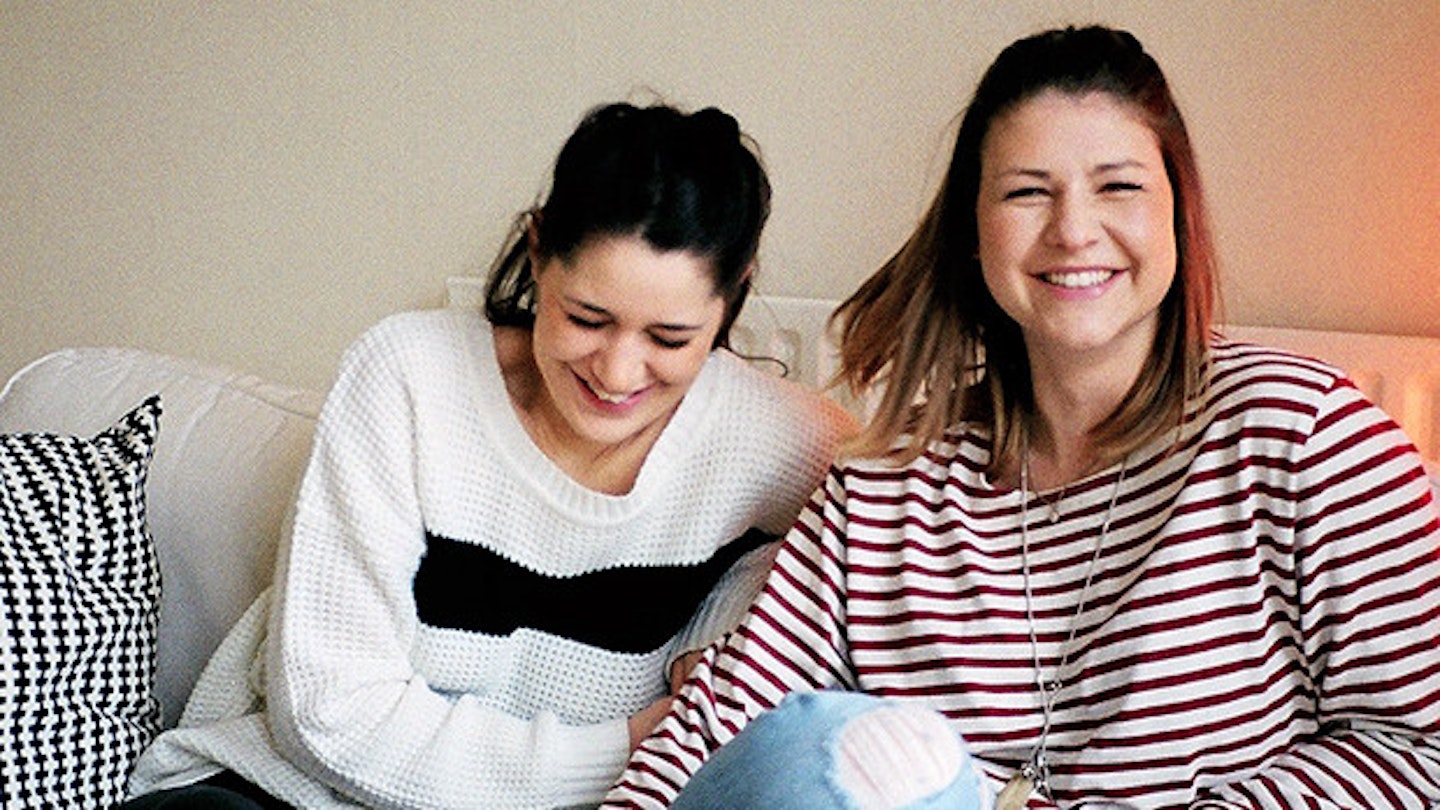Forget the nuclear family, chances are, if you’re in your twenties and attempting to kickstart your career, the most significant relationships you have will be with your flatmates.
Property group Knight Frank claims that 10 million of us now privately rent – that’s twice as many as a decade ago. In London, 19% of properties have no living room, and 5% of us bunk up with a room mate (that figure doesn’t include couples!). And the number of people who have lived in a property with four of more people has risen over the last three years from 34% in 2011 to 38% now.
And you might well find you’re in it for the long haul. The chances of any of us being able to buy our own place, or even rent a one-bedroom flat (HA HA HA HA HA.... sorry) in the next decade are slim. So instead of spending a speedy couple of years in a flatshare after uni while you save up for your first place, that houseshare with its fraying carpets, dodgy heating and weirdo landlord, is starting to define our adulthood as much as the fact that we’ve finally got a not-terrible job and can afford to spend more than £20 on a haircut (maybe).
So you and your housemates are in it together, potentially for a loooong time. But how the devil do you make it work? To figure out the secret recipe for gelling *Friends-*style, we spoke to three separate groups of housemates who have lived together for over four years (one group is pushing seven, which is basically marriage. Or a commune) to find out what they’ve learned over the years of co-habiting.
So here are the words of wisdom from Jess and Liv (pictured – four years), Grace (six years), and Lauren (six years). Never more shall you find yourself in the kitchen frustration-crying because your housemate keeps leaving the colander in the wrong cupboard...
Go on dates
No, really. And not, like, sex-dates but friendly dates so you don’t end up stuck in a housemate rut of only speaking to each other when you need to sort out the heating/clean the bathroom.
‘It sounds weird, but sometimes one of us will say, “Do you want to get out and do something as friends?!” because we sometimes forget we waste these days after work just hanging about – and I don’t count that as quality time,’ says Liv, who has lived with Jess for four years.
‘We’ll have date nights where we do things, like go to the cinema or go for dinner, or we’ll go and meet up with other friends.’
Brush aside the little things
As in, get over it if they leave the colander in the wrong cupboard! How bad is that, really? On a scale of one to genocide?
Lauren, a writer who lived with her housemate for six years before recently moving out to live with her boyfriend says: ‘Silently moving/changing/tidying things and never actually mentioning it helps. When I first moved in with my boyfriend I found it a total culture shock that I was actually allowed to shout at him for leaving his pants on the table, or doing really lazy washing up.
‘You might be totally comfortable with arguing loudly about everything “to clear the air”, but if they’re not, then you could just create more tension that lasts for ages. Save it for something that really matters.’
But be really honest, and talk about stuff too
In Grace’s house, they clear the air immediately – rather than leave little Post-it notes lying around, or let it build up. ‘We are all honest, if you have anything to say, say it,’ she says. ‘If they’ve left gross plates out or something, we also always end up laughing and being like, “Oh God, you’re such a grot bag” rather than leaving it outside their room passive aggressively. The other guys have lived with people like that and it’s horrible.’
Facebook messaging and texts don’t count either, because it’s always better to speak face to face about certain things. ‘There’s nothing easier than having a conversation, and it means that nothing turns into a big drama,’ she adds.

Know your limits
Are you shit at bills, paperwork and admin? But is your housemate rubbish at remembering to do the dishes? It’s all swings and roundabouts, so you’ve got to accept strengths and weaknesses without demanding everyone is great at everything.
‘I am pretty much awful with bills. I am really bad at organising myself, but Jessie is the queen of paperwork. She deals with it all, and we have a shared account we put money into every month for our bills,’ says Liv.
‘The best thing is to be like, “Look, my bank account doesn’t grow on trees – can you turn the heating off?”. It’s always harder to do that, but it should be alright if you’re good friends.’
Give people space, if they need it
Some people like to hang out all the time in the living room and chat. Some people need a bit of time to recharge.
‘I love my own space, so I’ll come in and go upstairs for about 15, 20 minutes for a mooch in my room,’ says Grace. “Then I can come down and hang out with everyone. It’s really important to feel like you can go into your room, without everyone presuming you’re in a bad mood.’ Preach.

Don’t be a Food Dick
The Food Dick manifests itself in a million different ways, and we can all be weird with food. Whether it’s refusing to buy communal olive oil and demanding everyone use their own, eating everything in sight, or never offering to cook, it’s good to know your own Food Dickishness and learn to harness it.
‘Offer to share meals if you’ve cooked too much, share basics like milk and butter, etc, and don’t pinch things they’ll obviously miss like whole tins of soup or half a cake,’ says Lauren.
**Arguments/annoyances are normal and healthy. Accept this. **
Both of you are different, otherwise you’d be clones and would speak at the same time and nobody would want to come round and hang out with you.
‘My housemate’s definitely more houseproud than I am, and has higher standards of cleanliness, so I know there were definitely times I pissed her off by leaving kirby grips littered round the bathroom, or leaving mugs on her antique table without coasters,’ says Lauren.
‘But equally I thought I was really quite clean and considerate compared to your average 20-something, and would get defensive about being made to feel slobby. We definitely had a couple of showdowns over noise, if she’d gone to bed early and I’d come back late and was talking loudly outside her bedroom door.’
Six years, guys. They fought, but they made it through six years because they don’t hold grudges – it’s better to be out than in (a good motto for life in general, that).
**Say sorry if you’ve done something shitty **
Nothing worse than never admitting you’re wrong, and never apologising for your part in an argument. Liv suggests going one step further, and really cementing the apology with a small token present.
‘If you’ve done something crappy, always apologise and do a Tesco run to get them their favourite sweets. That’s the best thing you can do,’ she says. ‘Leave it outside their door and be all “Sorrrrryyyyyy”’.
If you can include some type of bow, then you get 10 extra housemate points.

Don’t have a cleaning rota, go for zones
Lauren and Grace never had a rota, but they each were territorial about various areas in the flat.
‘I cleaned the kitchen a lot, wiped down all the surfaces, kept the hob clean, put the washing up away and things, while she was more fanatical about floors and hoovering,’ she says. ‘In our uni house, we’d blitz the place every time we had a house party, and the rest of the time more or less just keep it from tipping over into “full hovel”.’
Grace’s house operates in a similar way, highlighting just how important it is that you and your flatmates are on the same page when it comes to cleaning. ‘We all have our areas, and we don’t really argue about it. If it’s getting a bit too much, and it looks horrible then occasionally one of my housemates will send out a group message,’ she says. ‘Or we’ll be like “This place is a shithole we want to live in a nice house, let’s sort it”.’
Sometimes, being really anal about cleaning can be just as bad – Grace works with someone whose housemate texted her because a toothbrush was out of its holder. ‘I couldn’t live like that. I like places to be clean, but that would drive me crazy,’ she adds.
**Be reasonable when it comes to boyfriends/girlfriends **
At Liv and Jess’s pad, Liv has a boyfriend and Jess doesn’t, so there’s a degree of sensitivity that’s necessary to stop everyone feeling claustrophobic (especially if, like them, you live in quite a small place).
‘That can definitely be a problem, our flat is quite small and when all of us are in there it’s a tight fit, so I say when he’s coming over. I’ve got to respect that if she hasn’t got any plans, I can’t bombard her with my boyfriend coming round.’
One way to get around it is for both sides to feel like they can text and be like, ‘I’d prefer it if we just had to the flat to ourselves tonight,’ so nobody gets stressed out. Nothing worse than tension between your best mate and your fancyman/woman.
Like this? You might also be interested in...
Seven Blood Boiling Things My Housemate Does In The Bathroom
Photographs by Matilda Hill-Jenkins
This article originally appeared on The Debrief.
